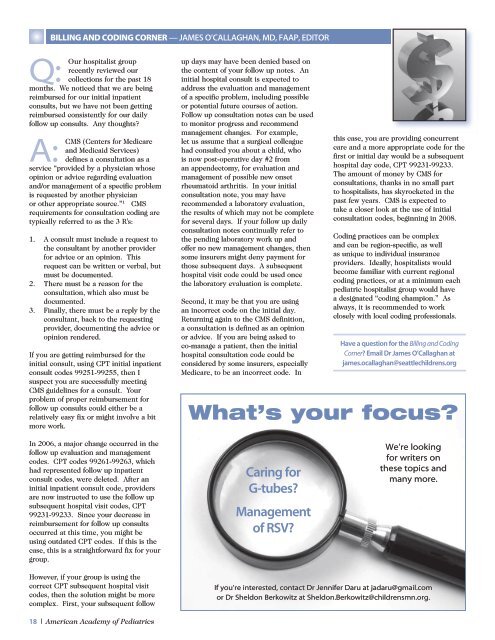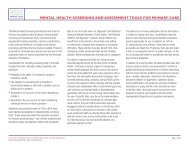Susan Wu, MD, FAAP, Editor - American Academy of Pediatrics
Susan Wu, MD, FAAP, Editor - American Academy of Pediatrics
Susan Wu, MD, FAAP, Editor - American Academy of Pediatrics
You also want an ePaper? Increase the reach of your titles
YUMPU automatically turns print PDFs into web optimized ePapers that Google loves.
Q:<br />
Our hospitalist group<br />
recently reviewed our<br />
collections for the past 18<br />
months. We noticed that we are being<br />
reimbursed for our initial inpatient<br />
consults, but we have not been getting<br />
reimbursed consistently for our daily<br />
follow up consults. Any thoughts?<br />
A:<br />
CMS (Centers for Medicare<br />
and Medicaid Services)<br />
defines a consultation as a<br />
service “provided by a physician whose<br />
opinion or advice regarding evaluation<br />
and/or management <strong>of</strong> a specific problem<br />
is requested by another physician<br />
or other appropriate source.” 1 CMS<br />
requirements for consultation coding are<br />
typically referred to as the 3 R’s:<br />
1.<br />
2.<br />
3.<br />
BiLLiNG aND CoDiNG CorNer — JAMES O’CALLAGHAN, <strong>MD</strong>, <strong>FAAP</strong>, EDITOR<br />
A consult must include a request to<br />
the consultant by another provider<br />
for advice or an opinion. This<br />
request can be written or verbal, but<br />
must be documented.<br />
There must be a reason for the<br />
consultation, which also must be<br />
documented.<br />
Finally, there must be a reply by the<br />
consultant, back to the requesting<br />
provider, documenting the advice or<br />
opinion rendered.<br />
If you are getting reimbursed for the<br />
initial consult, using CPT initial inpatient<br />
consult codes 99251-99255, then I<br />
suspect you are successfully meeting<br />
CMS guidelines for a consult. Your<br />
problem <strong>of</strong> proper reimbursement for<br />
follow up consults could either be a<br />
relatively easy fix or might involve a bit<br />
more work.<br />
In 2006, a major change occurred in the<br />
follow up evaluation and management<br />
codes. CPT codes 99261-99263, which<br />
had represented follow up inpatient<br />
consult codes, were deleted. After an<br />
initial inpatient consult code, providers<br />
are now instructed to use the follow up<br />
subsequent hospital visit codes, CPT<br />
99231-99233. Since your decrease in<br />
reimbursement for follow up consults<br />
occurred at this time, you might be<br />
using outdated CPT codes. If this is the<br />
case, this is a straightforward fix for your<br />
group.<br />
However, if your group is using the<br />
correct CPT subsequent hospital visit<br />
codes, then the solution might be more<br />
complex. First, your subsequent follow<br />
18 | <strong>American</strong> <strong>Academy</strong> <strong>of</strong> <strong>Pediatrics</strong><br />
up days may have been denied based on<br />
the content <strong>of</strong> your follow up notes. An<br />
initial hospital consult is expected to<br />
address the evaluation and management<br />
<strong>of</strong> a specific problem, including possible<br />
or potential future courses <strong>of</strong> action.<br />
Follow up consultation notes can be used<br />
to monitor progress and recommend<br />
management changes. For example,<br />
let us assume that a surgical colleague<br />
had consulted you about a child, who<br />
is now post-operative day #2 from<br />
an appendectomy, for evaluation and<br />
management <strong>of</strong> possible new onset<br />
rheumatoid arthritis. In your initial<br />
consultation note, you may have<br />
recommended a laboratory evaluation,<br />
the results <strong>of</strong> which may not be complete<br />
for several days. If your follow up daily<br />
consultation notes continually refer to<br />
the pending laboratory work up and<br />
<strong>of</strong>fer no new management changes, then<br />
some insurers might deny payment for<br />
those subsequent days. A subsequent<br />
hospital visit code could be used once<br />
the laboratory evaluation is complete.<br />
Second, it may be that you are using<br />
an incorrect code on the initial day.<br />
Returning again to the CMS definition,<br />
a consultation is defined as an opinion<br />
or advice. If you are being asked to<br />
co-manage a patient, then the initial<br />
hospital consultation code could be<br />
considered by some insurers, especially<br />
Medicare, to be an incorrect code. In<br />
Caring for<br />
G-tubes?<br />
Management<br />
<strong>of</strong> RSV?<br />
this case, you are providing concurrent<br />
care and a more appropriate code for the<br />
first or initial day would be a subsequent<br />
hospital day code, CPT 99231-99233.<br />
The amount <strong>of</strong> money by CMS for<br />
consultations, thanks in no small part<br />
to hospitalists, has skyrocketed in the<br />
past few years. CMS is expected to<br />
take a closer look at the use <strong>of</strong> initial<br />
consultation codes, beginning in 2008.<br />
Coding practices can be complex<br />
and can be region-specific, as well<br />
as unique to individual insurance<br />
providers. Ideally, hospitalists would<br />
become familiar with current regional<br />
coding practices, or at a minimum each<br />
pediatric hospitalist group would have<br />
a designated “coding champion.” As<br />
always, it is recommended to work<br />
closely with local coding pr<strong>of</strong>essionals.<br />
Have a question for the Billing and Coding<br />
Corner? Email Dr James O’Callaghan at<br />
james.ocallaghan@seattlechildrens.org<br />
What’s your focus?<br />
We’re looking<br />
for writers on<br />
these topics and<br />
many more.<br />
If you’re interested, contact Dr Jennifer Daru at jadaru@gmail.com<br />
or Dr Sheldon Berkowitz at Sheldon.Berkowitz@childrensmn.org.



